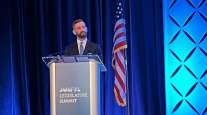Senior Reporter
After Nearly 35 Years With Port Association, CEO Kurt Nagle Retires on Top

[Stay on top of transportation news: Get TTNews in your inbox.]
Kurt Nagle left the helm of the American Association of Port Authorities on Oct. 16, retiring as its president and CEO after serving the organization for more than three decades.
Nagle joined the port services association in 1985 and spent his first decade in its government affairs division. He was named president and CEO in 1995.
Seaports are all about partnerships! New AAPA President & CEO Chris Connor understands our core mission – collaboration at municipal, state, federal and international levels to bring Americans the goods they use every day. pic.twitter.com/dWGNNbkt0Z
— AAPA (@AAPA_Seaports) October 11, 2019
AAPA named Christopher Connor, a veteran shipping executive, its new president and CEO.
“It’s a good time for me to retire and go to the next stage,” Nagle said. “And I think we’re leaving the industry in good hands.”
Nagle presided over explosive growth.
For example, at his start in 1985 the nation’s busiest seaport, the Port of Los Angeles, processed for the first time more than 1 million 20-foot-equivalent unit containers. Today that facility’s volume is closing in on 10 million TEUs for the year, officials said.
And the growth has been strong across the country, particularly on the East Coast.
Take the Port of Savannah. It is on a pace to shatter its 2018 record of 4.35 million TEUs, and port officials project handling as many as 11 million TEUs a year by 2030 as it completes expansion programs.
#ICYMI: To keep up with growing container trade, the GPA plans to double Garden City Terminal’s annual capacity from 5.5 million to 11 million TEUS. #GeorgiaPorts #gaports https://t.co/Rt1KPK9sCR — Georgia Ports (@GaPorts) October 1, 2019
“Our overarching priority was always to keep the industry together, provide that forum where people could get together, build relationships and have the ability to reach out across the hemisphere to help each other,” said Nagle.
Nagle said he believes he is leaving his post at a good time, as the major ports are spending hundreds of millions of dollars to keep up with the rapid expansion that is going to be required as larger Neopanamax ships become routine at U.S. ports, especially now that the Panama Canal has expanded its locks to accommodate the bigger vessels.
Most major ports already started dredging and buying new equipment like cranes, or they’re planning to.
Last year Congress appropriated $293 million in federal assistance for port expansion, and local and state governments are also pouring in funds on their own.
In April, bipartisan legislation was introduced in the House of Representatives calling for $34 billion in spending over the next 10 years for various harbor project capital improvements.
“This provides a recognition at the federal level that our ports and the connections to our ports are critical to our economy,” said Nagle.
He added many ports are also taking advantage of low interest rates to borrow for some of their capital improvements.
Nagle believes in free trade and he told Transport Topics while the United States and China appear to have made some progress on trade talks, more needs to be done soon to restore stability.
“I think both sides have enough at stake, there is certainly incentive on our end here,” he said. “And the Chinese are seeing enough impact, enough hurt in their economy that there is enough benefit for both sides. I would be surprised if we don’t have an agreement prior to the November election. There is some uncertainty, and bumps in the road. We certainly want to advocate that. Let’s finalize these negotiations.”
Nagle is also urging both houses of Congress to pass the U.S.-Mexico-Canada trade agreement, which he believes is a significant upgrade, especially for the freight industry, over the more then 25-year-old North American Free Trade Agreement.
“Let’s get those new negotiations finalized, the new agreements in place, USMCA, and restore more stability and certainty to the trade environment,” he said. “Because I believe that’s the one thing that’s putting the thumb on the scales in terms of slowing down the economy or creating uncertainty.”
Want more news? Listen to today's daily briefing:



